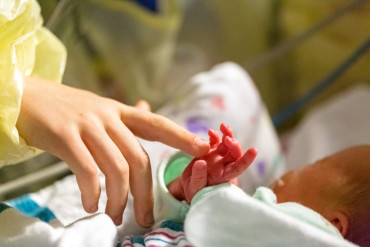How Does Lack Of Oxygen During Delivery Impact A Baby’s Brain?

Humans have to have oxygen to survive, even before they are born. Once born, babies breathe oxygen into their lungs through their nose and mouth. While in the womb, a baby takes in oxygen from its mother through the umbilical cord, which connects to the placenta.
Through the placenta, which develops and attaches to the inside of the womb, the baby receives all the nutrients and oxygen it needs during the pregnancy. Until a baby is born and can breathe independently, it has to have a functioning umbilical cord that can transmit oxygen from the placenta.
Unfortunately, there are times during labor and delivery that result in a baby not getting enough oxygen, and it can result in serious complications, permanent disabilities, or even death. Sometimes, cases in which a baby is deprived of oxygen are preventable. They occur due to a doctor’s negligence or error. When that happens, parents may be able to sue the responsible medical provider in a medical malpractice lawsuit.
When Asphyxia Causes Oxygen Deprivation In A Baby
When someone is deprived of oxygen, it is called asphyxiation. Asphyxia can lead to death if the person isn’t revived immediately, restoring oxygen to the brain and other vital organs. When a baby doesn’t get enough oxygen during childbirth and survives, the baby may suffer serious and permanent brain damage. Asphyxia can cause developmental, neurological, physical, and mental health abnormalities. Even if a baby is deprived of oxygen for a short time, it can lead to severe injuries.
One of the most common conditions that result from asphyxiation at birth is hypoxic-ischemic encephalopathy (HIE). The condition is the direct result of an acute or subacute brain injury due to a loss of oxygen flow to a baby’s brain during pregnancy, labor, or birth. When deprived of oxygen, the baby’s developing brain cells will decay and begin to die.
Does HIE Lead To Lifelong Cognitive Problems?
Babies who suffer from HIE after birth may have short and long-term effects. In the short term, the baby may have feeding problems, depressed level of consciousness, hypotonia (floppy and loose body), organ problems, poor reflexes, and neonatal seizures. The baby may also have trouble breathing, abnormal light responses, and heart and blood pressure problems.
Many short-term problems can lead to long-term consequences when they are not properly diagnosed and treated. For example, a baby with difficulty breathing or regulating blood pressure may sustain additional brain damage if they don’t receive prompt and appropriate treatment.
Babies with oxygen deprivation at or during birth are often diagnosed with HIE. Some children with the condition will not suffer long-term effects. However, babies with permanent brain damage from HIE may develop additional conditions, including:
- Blindness or other visual impairments
- Deafness
- Learning disabilities
- Developmental delays
- Epilepsy or other seizure disorders
- Emotional and behavioral disorders
- Respiratory conditions
- Orthopedic problems
- Cerebral palsy
The long-term conditions of HIE depend on how severe the brain injury was and which parts of the brain it affected.
Children diagnosed with HIE frequently require significant, long-term levels of medical care, therapy, and treatment. This can be a tremendous emotional and financial strain on parents and families. When asphyxia at birth is caused by medical negligence, a lawsuit may help families recover the compensation needed to provide for their babies after they suffer a birth injury like HIE or cerebral palsy.
What Should You Do If Your Child’s HIE Was Due To Medical Negligence?
Suppose your child suffered a lack of oxygen and HIE due to the negligence or error of a medical professional. In that case, you may be able to file a claim seeking compensation and justice for your baby’s injuries. No baby, before, during, or after birth, should suffer brain damage due to oxygen deprivation. In Pennsylvania, the law allows parents who have a valid case the legal avenues to hold the responsible parties accountable for the damages they caused. And the birth injury attorneys at the Philadelphia law firm of Ross Feller Casey are here to help.
At Ross Feller Casey, we have a successful track record of winning significant financial awards for your clients. We have helped families like yours get out from under the heavy burden of medical bills and expenses accompanying the devastating consequences of medical malpractice. Additionally, we have a team of on-staff physicians who evaluate medical records and assist with cases like yours.
Contact Ross Feller Casey today to schedule your free consultation with an experienced birth injury lawyer. We don’t charge you anything until we win your case.
Disclaimer: Ross Feller Casey, LLP provides legal advice only after an attorney-client relationship is formed. Our website is an introduction to the firm and does not create a relationship between our attorneys and clients. An attorney-client relationship is formed only after a written agreement is signed by the client and the firm. Because every case is unique, the description of awards and summary of cases successfully handled are not intended to imply or guarantee that same success in other cases. Ross Feller Casey, LLP represents catastrophically injured persons and their families in injury and wrongful death cases, providing legal representation in Pennsylvania and New Jersey.





